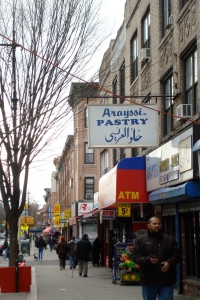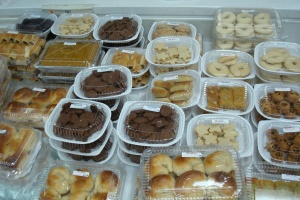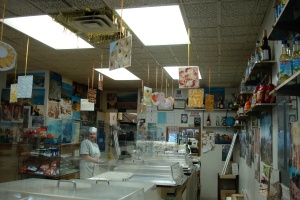An shorter version of this article was posted on the Common Ground News Service.
On Fifth Avenue in Bay Ridge Brooklyn, between eateries fragrant with Middle Eastern scents, stands a small pastry store since 1992, Sweet Arayssi. Rima Arayssi, 43, is the fifth generation of a family of Muslim confectioners operating since 1844, in Lebanon. Her achievement goes beyond the family business to transforming the store into an oasis of coexistence among customers who have long-time religious and political tensions. She has continued to keep her bakery Kosher, as her father did, to cater for Lebanese Jews, among other Arab Jews residing in Brooklyn.

The store in Bay Ridge Brooklyn (Photo Credit: Carla Haibi)
Most days, Lebanese Muslim, Christian and Jews meet at her store and find comfort in what they undeniably share, the longing to the sweet taste that reminds them of their shared cultural identity and home country thousands of miles away.
“Outside Lebanon, Lebanese from all backgrounds get along well and share the nostalgia for their country,” said Charly Mizrahi, 51, a freelance correspondent and a customer of Sweet Arayssi since it opened.
Outside the shop small Lebanese flags adorn the front door. Inside, a wafting aroma of ghee, or clarified butter, a key ingredient in the sweets, sets a warm ambiance. Freshly made varieties of flaky Baklavas with a shimmering glaze of syrup sit in large pans on one counter. On another, sits a display of butter cookies, saffron with pine nut cakes and coconut with sesame seed pastries, among other Middle Eastern delicacies. The boxes carry a label with the letter K, to indicate that they are made solely with kosher ingredients and set them apart from imported non-kosher sweets.
“Ahlan,” (welcome in Arabic) yells Arayssi, from the back kitchen. Clad with grey sweatpants and a t-shirt of the same color, she carries extra weight visible in her plum cheeks and her shapely six-foot tall figure. Long earrings with purple shells droop from her ears. Her eyes are drawn and extended by a thick black eyeliner pencil. Under a white paper chef’s hat, she wears her blond hair in a ponytail.
This cool morning in spring, she stands in front of the stove, rotating a heavy platter of kneffe, a Middle Eastern breakfast made with semolina rubbed with ghee, flour and sugar topped with a thick layer of cheese and cooked until the semolina crust turns golden brown. Served fresh daily in a sesame bun drizzled with sugar syrup, the popular item is Organic and Kosher, just like the rest of her products.
The latter term was a novelty for her in 1996 when Arayssi handled the operation of her dad’s store. She got introduced then, to the Jewish culture. Growing up in Lebanon, she rarely heard of this community. She was a child when Jews started leaving in the 1960s. Yet, she remembered stories of her grandmother who used to go to her Jewish neighbors’ house and turn off their lights for Shabbat. Arayssi heard stories of a life of tolerance among all Lebanese during her parents’ and her grandparent’s’ youth, but not in hers and not in the recent years.
Tolerance and coexistence are terms that Arayssi lives by every day. Born into the Muslim faith, she and her sisters went to a Jesuit school in Lebanon, just like her father and her grandfather who were baptized Christian. Her mother is an observant Muslim who prays five times a day. Arayssi though, married a Lebanese Christian.
“I think the more people marry in between religions the better the understanding among them will be,” she said. “There is a lot of fear from the other religion, ignorance really. There are a lot of preconceptions, a lot of judgments that are set in people’s minds.”
Arayssi feels privileged to be comfortable in both Muslim and Christian environments and she plans to raise her 4-year-old daughter in that same spirit of coexistence. “I want her to understand that all people are the same,” she said. “God is one, but we each take a different way to get to him.” She held a similar attitude of tolerance for all religions when she took over her father’s store.
In 1996, she left Lebanon and a career in advertising. A timely occurrence with her father’s wish to retire, led Arayssi and her husband, straight to the kitchen. She rolled up her sleeves, put on a chef’s hat and started learning the craft of making sweets. Such an encounter changed the course of her life and uncovered her passion for creating something that people liked and came back for.
Considering the high demand for the distinctive flavor of her sweets by the Jewish community in Brooklyn, she carried on her father’s decision to get a Kosher certification and cater for her newly discovered clientele.
Arayssi pushed it further by getting a calendar for Jewish holidays as well as Muslim and Christian holidays and planned the sweet preparation accordingly.

Arabic Kosher Sweets (Photo Credit: Carla Haibi)
She learned the principles of the Kashrus, the Jewish dietary laws and changed the operation of her store to qualify for the Kosher certification. Hard decisions were made in the process. She had to choose to make sweets exclusively and cancel the preparation of certain Lebanese food items, which were in demand but contained meat products. According to the Kashrus, meat-containing products could not be prepared in the same kitchen where dairy products are used. So Arayssi decided to stick to kosher pastries.
The Kosher certification was pricy though, a $ 4,000 yearly fee, paid to rabbis who inspected the kitchen on a regular basis. Kosher ingredients, more expensive than regular ingredients, had to be used exclusively in the preparation of the sweets. Arayssi could have taken it a step further by making Parv sweets especially for Passover. Parv means that the food does not contain any animal fats, but made with oil instead. Yet she did not want to jeopardize the flavor especially for the rest of her non-Jewish clients. “Arabic sweets do not have the same taste when made with oil,” she said.
Going kosher was one thing, keeping all her customers happy was another.
Arayssi sometimes feels that her role is delicate especially in trying to divert politically charged conversations, a complicated task when the situation in Lebanon is not stable. “Lebanese can easily argue with each other, and are very politically biased,” she said, adding ” This shop,” is not the place to talk about politics.” In fact, she chose to turn the television off in the store because Lebanese news broadcasts created tensions.
Instead, she preferred to oblige in her customers’ feelings of nostalgia, those who have been in the US for a long time, by telling them stories about Lebanon, and speaking Arabic (with the Lebanese dialect). “Some come here to practice the language,” she said. ”Others tell me, ‘this is smell of Lebanon,’ when they come into the store.”
Arayssi saw herself as the guardian of traditions, a way for her and her customers to remember their roots. “Somebody has to preserve the traditions, and food is a very important way to do it,” she said.
Such claims have made her reputation. Mike Ghaida, a Lebanese man in his 40s, is the president of a contracting company and has been in the US since 1983. He stops by on his way home to New Jersey from work in Brooklyn to buy what he deems the best Arabic sweets ever made. “For me this place is like a connection to Lebanon. It means traditional, real, homemade Middle Eastern, old-fashioned, high quality sweets,” he said firmly.

Arayssi store full of posters and artifacts that remind the home country (Photo Credit: Carla Haibi)
The task of making such artisanal delicacies is physically exhausting though. Arayssi spends at least eight hours a day standing in the kitchen, rolling, cutting and baking. “I inherited this craft from my father, I never went to pastry school,” she said proudly.
Adamant on producing consistent quality and taste, Arayssi finds pleasure in making every batch of sweets. Uniformity in shape however is difficult to maintain since each batch is handcrafted similar to a painting. “The work is artisanal, we work with our hands, we are creating everything from scratch,” she said.
While waiting for their order to be wrapped, customers like Ghaida often linger over the selection of antique posters of landscapes and monuments from Lebanon covering the walls floor to ceiling.
Determined to display the beautiful image of her country and dismiss common misconceptions that Lebanon is a dessert and that Lebanese live in tents and ride camels, Arayssi enjoys the positive echo that these images had.
“Some young Lebanese guys bring their girlfriends to the store just to show them what Lebanon looks like,” she said with a giggle.





